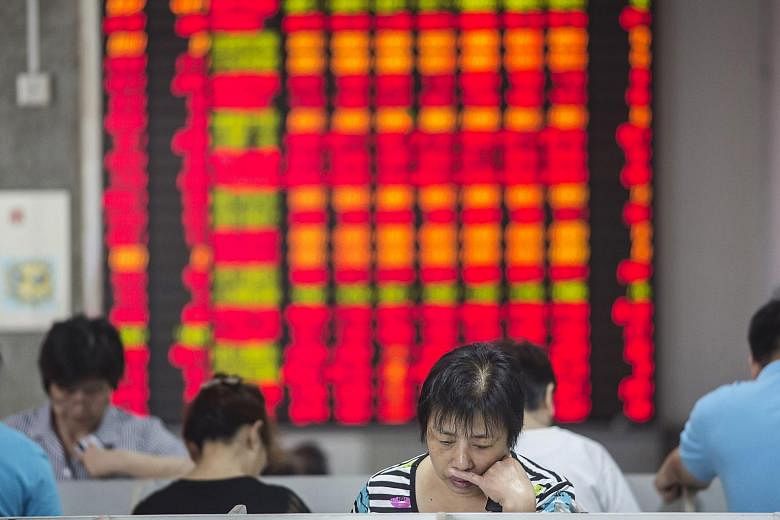SHANGHAI - Trading on the Shanghai and Shenzhen stock markets was halted for the day on Monday (Jan 4) after shares fell 7 per cent.
The drop in the CSI300 index, which covers both bourses, for the first time triggered an automatic early closure under a new system to curb volatility, after an earlier 15-minute trading halt failed to stem the declines.
Under the mechanism which coincidentally took effect on Monday, a move of 5 per cent in the CSI 300 triggers a 15-minute halt for stocks, options and index futures, while a move of 7 per cent close the market for the rest of the day. China introduced the stock-market circuit breaker to help calm volatility after last year's summer rout sent price swings in the benchmark index to 18-year highs.
Asian stocks also slumped after the worse-than-expected Chinese manufacturing report and escalating Middle East tension saw investors shun riskier assets. Crude oil prices jumped.
Hong Kong's Hang Seng Index fell 2.8 per cent while Japan's Topix index lost 2.5 per cent, on track to posting its worst opening day to a year since 2008. Taiwan's benchmark equity gauge sank 2.7 per cent, while the Straits Times Index retreated 1.6 per cent in Singapore.
The MSCI Asia Pacific Index tumbled 2.1 per cent to head for its steepest drop since Sept 29. Haven assets from gold to Treasuries advanced, with the yen touching the strongest level since October.
West Texas Intermediate crude rose 2.1 per cent as Saudi Arabia expelled Iran's diplomats from the country after its embassy in Teheran was attacked to protest the Saudis' execution of a prominent Shiite cleric.
"We were starting to see signs that the economic slowdown in China had run its course, so today's report was a disappointment," said Masayuki Otani, Tokyo-based chief market strategist at Securities Japan Inc. "The Saudi Arabia and Iran issue might be good for oil, but the increase in geopolitical risk means it's an overall negative for the financial markets."
The Bloomberg Commodity Index plunged 25 per cent last year amid an oil supply glut and as Chinese economic growth slowed, pressuring equity markets and corporate profits. The Caixin factory index came in at 48.2 in December, a report showed Monday, missing estimates for a reading of 48.9. On Jan 1, China's first official economic report of 2016 signaled manufacturing weakened for a fifth month, the longest such streak since 2009.
"It's a poor start of the year with a lot of bad news," said Win Udomrachtavanich, Bangkok-based chief executive officer at One AssetManagement Ltd., which oversees about US$3.5 billion. "Most investors expect the tension between Iran and Saudi Arabia will be contained and limited. Still, it becomes the big risk for the financial markets today."
The Bloomberg-JPMorgan Asia Dollar Index, which tracks the region's 10 most-used currencies excluding the yen, fell 0.3 per cent and was headed for its lowest close since April 2009. A gauge tracking 20 emerging-market currencies fell 0.2 per cent toward a record low.
Malaysia's ringgit and Indonesia's rupiah weakened the most in three weeks as an escalation of tensions between Iran and Saudi Arabia bolstered demand for the US dollar.
The offshore yuan declined to the lowest in five years after data showed manufacturing contracted for a fifth straight month, spurring speculation the central bank will guide the currency lower to help the economy.
BLOOMBERG, AFP, REUTERS

